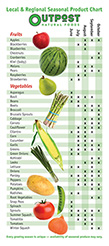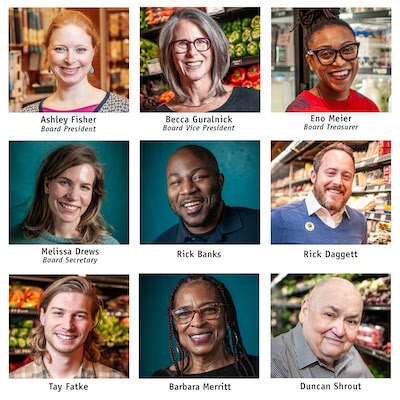Free Co-Op Month Film offers lesson in biodiversity

When we think about the word 'diversity', we usually apply it to groups of people. When a diverse group of people get together to create art, science, policies, products or laws, their outcome, is generally fresher and richer. Why? Because when we work with people who are not like us, we may think hard about our own ideas before offering them up to the team. Our ideas are tested under many lenses. The strong ideas/viewpoints/thoughts endure and the weaker do not. Through diversity, we can think out of the box and produce resilient ideas or products.
We can extend this idea and move it from the world of humans to the world of plants - specifically crops. A plant or crop growing in one environment might exhibit different disease or pest resistance - or behavior in general - over the same plant (or a close wilder cousin) growing in another environment. In fact, there are hundreds of similar-but-different plants scattered over the earth, each nuanced to thrive within its own environment.
We have seen that dependence on a monoculture can be dangerous. The Irish potato famine in the 1840s is one example of how the lack of diversity of one particular type of potato resulted in the destruction of the crop and the starvation of the people who were reliant on it. Had the Irish planted many varieties of potatoes, this would not have happened. Only some plants would have died, but the ones resistant to the blight would have lived. On the other hand, potato diversity is celebrated in Peru. Peruvian farmers have made it a point to preserve the genetic diversity of potatoes by growing many varieties alongside each other.
Unfortunately, biotech chemical companies have been working to control crops through patents and ownership of seed. This control has led to the wiping out thousands of varieties of plants as industrial farming has moved in. This has been detrimental to the environment and more importantly, it is detrimental to food security for humans.
In order to preserve biodiversity, the Svalbard Global Seed Vault was established in Norway in 2008. The intent of the seed vault is to keep alive the possibility of many species of plants that exist or existed in the world. In fact, there are plants that we currently may not value but we may learn that their genetic make up is needed in tomorrow's world. We cannot splice away the genes with the thought that they are not important to us today. Seeds offer us the possibility of tomorrow, and a variety of seeds makes that tomorrow so much stronger.
The film"Seed: The Untold Story" follows the work of some people who have taken steps to preserve plant biodiversity. It explores the dependence on biotech chemical companies, it reviews various seed collectors, and it inspires us to begin thinking about how we can help to preserve biodiversity.
Outpost's Board of Directors will present "Seed: The Untold Story" at Fox-Bay Cinema on October 26th. at 6:30 pm. This is a FREE event and everyone is welcome. You do not need to be an Outpost owner. The event will begin with a small presentation by Jennifer Casey, Executive Director at Fondy Food Center. The film will follow, and after it, we will host a discussion about seeds and biodiversity - perhaps your comments will inspire the other attendees to action! How are you preserving biodiversity in your world? Join us!
Thinking of becoming a Board Member? On October 26th application packets to run in the Outpost Board of Directors 2018 election will be made available. Consider running for the Board and contributing to your Co-op!
Swati Agterberg
Board Member
Comments
Bloggers
Archived Columns
Tags
Archives
-
April 2024 (1)
March 2024 (1)
February 2024 (1)
December 2023 (1)
August 2023 (1)
March 2023 (1)
February 2023 (1)
November 2021 (1)
September 2021 (1)
November 2020 (1)
October 2020 (1)
July 2020 (1)
June 2020 (1)
May 2020 (1)
February 2020 (1)
January 2020 (1)
December 2019 (1)
November 2019 (1)
October 2019 (1)
August 2019 (2)
May 2019 (1)
March 2019 (2)
January 2019 (1)
December 2018 (1)
November 2018 (1)
October 2018 (2)
September 2018 (1)
February 2018 (1)
November 2017 (2)
October 2017 (1)
July 2017 (2)
March 2017 (1)
February 2017 (1)
January 2017 (1)
December 2016 (2)
November 2016 (1)
August 2016 (2)
July 2016 (2)
March 2016 (2)
February 2016 (2)
January 2016 (1)
December 2015 (1)
October 2015 (3)
August 2015 (1)
July 2015 (2)
June 2015 (1)
March 2015 (2)
February 2015 (2)
January 2015 (2)
December 2014 (2)
November 2014 (1)
October 2014 (3)
August 2014 (2)
July 2014 (1)
June 2014 (2)
May 2014 (2)
April 2014 (1)
March 2014 (2)
February 2014 (2)
January 2014 (2)
December 2013 (1)
November 2013 (2)
October 2013 (1)
July 2013 (2)
June 2013 (1)
May 2013 (2)
April 2013 (1)
March 2013 (2)
February 2013 (1)
January 2013 (2)
December 2012 (3)
November 2012 (1)
October 2012 (3)
September 2012 (2)
August 2012 (4)
July 2012 (4)
June 2012 (6)
May 2012 (3)
April 2012 (4)
March 2012 (6)
February 2012 (8)
January 2012 (3)
December 2011 (4)
October 2011 (4)
September 2011 (3)
August 2011 (5)
July 2011 (7)
June 2011 (1)
May 2011 (2)
April 2011 (7)
March 2011 (10)
February 2011 (12)
January 2011 (11)
December 2010 (19)
November 2010 (13)
October 2010 (22)
September 2010 (16)
August 2010 (24)
July 2010 (33)
June 2010 (5)
May 2010 (52)
April 2010 (37)
March 2010 (55)
February 2010 (44)
January 2010 (46)
December 2009 (40)
November 2009 (26)
October 2009 (37)
September 2009 (34)
August 2009 (24)
July 2009 (21)
June 2009 (29)
May 2009 (30)
April 2009 (33)
March 2009 (16)
February 2009 (2)
January 2009 (5)
November 2008 (1)
October 2008 (1)
September 2008 (2)
August 2008 (3)
July 2008 (2)
June 2008 (6)
May 2008 (2)
April 2008 (10)
March 2008 (5)
February 2008 (5)
January 2008 (12)
December 2007 (5)
October 2007 (3)
August 2007 (3)
July 2007 (1)
June 2007 (5)
May 2007 (4)
April 2007 (6)
March 2007 (3)
February 2007 (3)
January 2007 (4)
December 2006 (2)
October 2006 (2)
September 2006 (5)
August 2006 (8)
0 (1)










